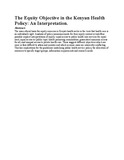The Equity Objective in the Kenyan Health Policy: An Interpretation.
| dc.contributor.author | Nganda, Benjamin M | |
| dc.date.accessioned | 2013-06-25T06:33:51Z | |
| dc.date.available | 2013-06-25T06:33:51Z | |
| dc.date.issued | 1998 | |
| dc.identifier.citation | Eastern Africa Social Science Research Review vol 14 issue 1 pg65-89 | en |
| dc.identifier.uri | http://erepository.uonbi.ac.ke:8080/xmlui/handle/123456789/39369 | |
| dc.description.abstract | The main ethical basis for equity concerns in Kenya's health sector is the view that health care is an individual's right. Analysis of policy pronouncements for their equity content reveals four possible implicit interpretations of equity: equal access to public health care services for equal need; equal access to (public type) health promoting commodities; guaranteed minimum access for all; and unequal access to private health care. These suggest different objectives which are more or less difficult to attain and monitor and which in some cases are inherently conflicting. This has implications for the guidelines underlying public health service policy, the allocation of resources to specific target groups, information requirements and research needs | en |
| dc.language.iso | en | en |
| dc.subject | public health | en |
| dc.subject | Politics and Government | en |
| dc.subject | Health and Nutrition | en |
| dc.title | The Equity Objective in the Kenyan Health Policy: An Interpretation. | en |
| dc.type | Article | en |
| local.publisher | School of Business | en |

